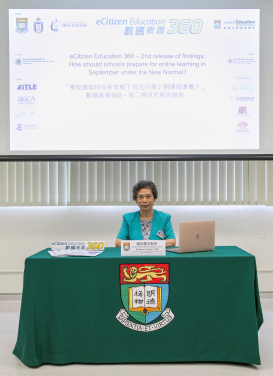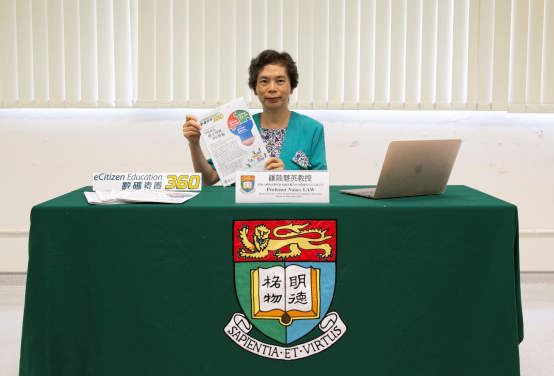Media
HKU study reveals e-learning coordination team composition and functions, and teacher professional development as critical to school preparedness for the New Normal with potential to narrow the digital divide for low socioeconomic status (SES) students
25 Aug 2020
Adding to their previous findings on socioeconomic divide and digital divide, Professor Nancy Law, Deputy Director of the Centre of Information Technology in Education, and Dr Tan Cheng Yong, Associate Professor, Academic Unit of Social Contexts and Policies of Education of the Faculty of Education, the University of Hong Kong (HKU), released their second report this afternoon (August 25). The latest discovery includes a multi-level model on how schools’ e-learning policy and implementation affects their IT/e-learning coordination teams’ size, composition and performance which in terms affect teachers’ support and ultimately students’ learning. This issue is based on the data collected during school resumption from June to July 2020, in a study entitled “eCitizen Education 360”. The first batch of research findings was released on July 20, 2020.
Key findings
1. Teachers’ preparedness for online teaching are positively correlated with students’ online learning experience and outcomes. The most prominent teacher preparedness factors include the extent to which they made use of different e-learning tools, their perception of the usefulness of different online teaching methods, and the support they received from their school during the school suspension period. These factors correlate positively with the intensity with which students participated in different types of online learning activities, the extent to which they have learnt new digital skills, and their academic self-efficacy during the school suspension period.
2. The e-learning implementation strategy is influential on teachers’ preparation and student experiences and outcomes in the following dimensions:
a. Diversified team composition contributes to positive student outcomes and teacher preparedness
The most important dimension was the IT coordination/e-learning coordination team composition and their roles. A school’s e-learning coordination team should be responsible for three types of functions: 1) overall strategic planning for e-learning development; 2) planning and organisation of pedagogical support and teacher professional development; and 3) routine operations and maintenance. These functions require the involvement of personnel with different expertise and decision-making capacities. The study found that five types of school personnel may be involved in a school’s e-learning coordination team: the IT coordinator, IT technicians, IT panel head and/or IT subject teachers, teachers of other subjects, and the academic leader of the school. Further, it was found that the more types of school personnel involved in e-learning coordination, the more positively it contributed to many aspects of students’ online learning experiences and outcomes, as well as to teachers’ online teaching preparedness. It was also found that the involvement of non-IT subject teachers in routine operations and maintenance had beneficial effects on improving students’ digital skills.
b. e-learning-related teacher training is correlated to teachers’ online teaching preparedness and students’ digital skills improvement
The number of e-learning-related teacher professional development opportunities organised by the school in the 2019-20 school year and the types of people involved in conducting those training activities were positively correlated with teachers’ online teaching preparedness and students’ digital skills improvement.
c. Some technical infrastructure features reflect schools’ priority on student-centred pedagogy especially in streaming devices and learning management systems (LMS)
Schools differ greatly in terms of their digital technology infrastructure. However, only two features are more correlated with students’ online learning outcomes: the extent to which the classrooms were equipped with streaming devices for easy projection of students’ work on mobile devices to the whole class, and the importance of the school’s LMS for teachers, students, parents and school administrators. These two indicators reflect the importance given by the school to student-centred pedagogy and online learning, rather than online instruction by teachers.
3. School’s online teaching preparedness is pivotal to students with lower socioeconomic status
The online teaching and learning preparedness at both teacher and school levels have differential effects on students’ online learning experiences and outcomes. It was found that all of the positive contributing preparedness factors had more prominent effects on students’ online learning outcomes during the school suspension period for those from low SES backgrounds, least effect on high SES students. This is possibly because high SES students had much more learning opportunities and support during school suspension other than from their schools and teachers. This also means that improving the online learning and teaching preparedness of schools and teachers will contribute towards mitigating the disadvantages in digital competence encountered by students from low SES backgrounds.
Key recommendations for schools on enhancing online learning preparedness
1. Build a composite, robust e-learning coordination team for student-centred decision-making and action alignment
Establish a strong school-based team for e-learning implementation that comprises not only teachers with expertise in ICT and IT technicians, but also personnel with decision-making capacities such as the Academic Leader, as well as teachers of non-IT subjects in order to develop and implement an all-round strategic plan for fully online and blended modes of learning and teaching. Moreover, schools also need to develop mechanisms to ensure tight coupling and alignment among members. This can be one important theme for interschool experience sharing for online learning preparedness.
2. Strengthen LMS for all stakeholders
In planning the school’s digital infrastructure, prioritise both on-site and online technology configurations that supports student-centred pedagogies, as well as peer interactions and collaborations. The role and functions of the school’s LMS should be strengthened to serve students, teachers, parents and school administrators in supporting student learning, peer interactions, assessment and feedback, rather than simply as a learning resources repository.
3. Provide more teaching and assessment related teacher professional development (TPD)
School-based TPD opportunities are important for fostering teacher preparedness. These TPD activities need to be practice-oriented, i.e. closely connected with blended and online modes of teaching and learning within the school curriculum. Such activities should also foster teacher collaboration and community building.
Professor Nancy Law observed, “Some schools allocate only technicians and IT teachers to the IT coordination team. Clearly, this composition no longer meets the needs of promoting a technology-based student-centred pedagogy or developing online teaching and assessment strategies required today. I believe we should now call it an e-learning coordination team and include subject matter experts and school leaders, such as academic master/curriculum leader, in order to develop and implement an all-round strategic plan for fully online and blended modes of learning and teaching.”
About “eCitizen Education 360”
The prolonged period of fight against COVID-19 and school suspension has posed huge challenges to every member of the education community. The tremendous effort of schools in sustaining learning online has not only overcome limits presented by social distancing, but inspired a new chapter of educational transformation as schools resume. The project is a comprehensive 360-degree survey study with widespread support from academia, parents, professionals and community organisations. By gathering information about the experiences and needs of primary and secondary schools during the periods of school suspension and resumption, we aim to enhance our comprehensive capacities to act as a community to improve the education opportunities, digital competence and well-being of students. These would also enable them to cope with various aspects of life in the fast-changing world in which digital technology plays a pervasive role.
For more details of the “e-Citizen Education 360” Project and the report, please visit https://ecitizen.hk/360.
To review the e-version of the press release, and download photos, presentation file and further reference materials, please visit: http://web.edu.hku.hk/press.
For media enquiries, please contact Ms Emily Cheung, Senior Manager (Development and Communications), Faculty of Education, HKU (Tel: 3917 4270 / Email: emchy@hku.hk), or Ms Cherrie Yan, Project Manager, “eCitizen Education 360” Project, Faculty of Education, HKU (Tel: 3917 0366 / Email: dcitizen@hku.hk).


